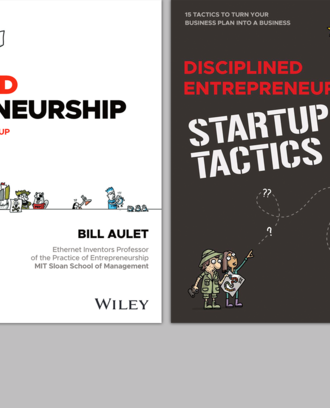Credit: delta v
delta v 2019 cohort infographic
Press
Entrepreneurship
MIT Sloan accelerator announces results of first self-awareness program for entrepreneurs
By
Entrepreneurial Confidence and Communication Program made significant impact on student founders
CAMBRIDGE, Mass., Dec. 10, 2019 – Anxiety and depression are common among entrepreneurs, who often dedicate all aspects of life to their startups. To address this issue, the MIT Sloan School of Management’s delta v accelerator launched the Entrepreneurial Confidence and Communication (ECC) Program last summer to help student entrepreneurs prioritize their own individual well-being while building their businesses. Measuring the results, the accelerator found significant improvements among participants in the adoption of self-awareness practices and tools to manage stress.
“The culture of entrepreneurship for the last 10-20 years has required 24-7 work to show your passion and dedication. Founders’ self-identity is often tied to the success of their startup. As a result, entrepreneurs often experience loneliness, depression, and anxiety, but lack the support and tools to improve their mental well-being,” said, executive director of the Martin Trust Center for MIT Entrepreneurship and director of the delta v accelerator. “The ECC Program is the first entrepreneurship program to help student founders address these issues and to provide data on the results.”
The goal of the 12-week ECC Program was for the cohort of 84 delta v undergraduate, graduate, PhD and post-doctoral students and team members to develop a greater understanding of themselves so they could make better choices for themselves and their startups.
Kathleen Stetson, the program’s creator and an MIT Sloan MBA alumna, said, “The uncertainty and risk inherent in entrepreneurship make stress almost inevitable, but cultivating self-awareness through practices like meditation and mindfulness can help entrepreneurs be less affected by that stress, enabling more effective decision-making.”
In the first six weeks, participants were taught the tools and benefits of self-awareness. In the second six weeks, they applied their learnings, discussing key choices entrepreneurs face, such as: taking breaks vs. spending all your time on your startup, working through limiting beliefs, considering others’ perspectives, and approaching challenges with fear or curiosity. Participants learned through readings, optional group meditation, and small-group sessions, where they could vent and get feedback on challenges they were facing in a confidential setting.
“We surveyed participants before and after the program, and we are thrilled by the results. Participants didn’t just learn that self-awareness practice can benefit them – they decided to implement it on a regular basis in their own lives, and it had a measurable effect on their well-being,” said Stetson.
A comparison of surveys conducted before and after the program, with 60 participants responding, shows that at the end of the program:
- 88% had independently established their own regular, weekly meditation or mindfulness practice. Before the program, 65% had never meditated, and only 21% were regularly practicing meditation or mindfulness.
- 53% were more frequently utilizing a conscious tool to work through stress.
- 100% of the optional ECC one-on-one sessions were utilized, which reflects willingness to ask for help.
- 40% were more aware of their emotions.
- 34% of those who had established a meditation or mindfulness practice by the end of the program were more confident in their communications.
- 93% felt that self-awareness practice can help entrepreneurs create more successful businesses.
“Understanding yourself is essential to managing stress and it is a skill that can be taught. Mindfulness and meditation have proven positive effects in other industries, and now we have data that shows they can be significantly beneficial to founders and their team members. We believe that integrating self-awareness into the entrepreneurial experience will help prevent burnout, encourage better mental and physical health, and create better team dynamics. It’s great for entrepreneurs, and it could be great for their startups’ bottom line too,” said Stetson.
Cotter noted that “it’s valuable to learn this skill in school, where students have support. The ECC Program provides a unique opportunity to learn before students go into the real world. We want to start founders off on the right foot, and hopefully they will spread a self-awareness movement across the entrepreneurial ecosystem.”
She added, “MIT Sloan is one of the first schools to integrate self-awareness into entrepreneurship education. This program is a significant step forward and a differentiator for the delta v accelerator.”
About the MIT Sloan School of Management
The MIT Sloan School of Management is where smart, independent leaders come together to solve problems, create new organizations, and improve the world. Learn more at mitsloan.mit.edu.



